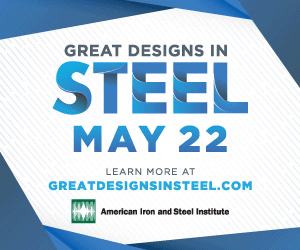Solid Carbide Drills are Designed for Manufacturability
Solid carbide drills support innovative manufacturing, and due to their higher metal efficiencies contribute to and maximize a shop’s productivity levels.
Posted: April 15, 2023
MACHINING MATTERS

British-American author and inspirational speaker Simon Sinek once said: “There’s nothing efficient about innovation.” But is he correct? The onus is on manufacturers to innovate and keep up with changes, particularly those driven by e-mobility. Manufacturers can — and must — innovate with efficiency with advanced solid carbide drills to keep up with these changes.
Design for manufacturability (DFM) has become increasingly important for manufacturers in a range of sectors — including automotive, aerospace and general engineering. DFM means designing and developing products that can be manufactured more easily, efficiently and cost-effectively. For machine shops, this normally translates to achieving a favorable cost-per-part when machining components, or cost-per-hole in drilling and tapping applications. Each of these objectives requires cutting tools that are extremely reliable and support high productivity.
What’s more, the concept of DFM is evolving due to an increasingly globalized supply chain and growing demand for customized products. E-mobility will affect DFM, too. Parts for electric and hybrid vehicles are more varied from manufacturer to manufacturer than their internal combustion engine equivalents. They are made increasingly from tough materials like low-alloy steels, Inconel and aluminum. While e-mobility trends in aerospace are still years away, the trends in automotive are upon us right now. Manufacturers must keep up with the changes or risk getting left behind.
But how can advanced tooling solutions make a difference to DFM? Answers can be found at the computer-aided design (CAD)-to-component phases of manufacturing. CAD-to-component can refer to three stages of manufacturing. First is the CAD-to-spindle phase, in which CAD and computer-aided manufacturing (CAM) models, including digital twin-like simulations, are used to prepare a machining operation and ensure the tooling, workpiece and machining parameters are all optimized.
Second is the spindle stage, or the actual machining operations. Here, we can assess the machining performance of the tool against the workpiece and its effect on cost-per-part, cost-per-hole and — ultimately — the machine shop’s bottom line.
Third is the spindle-to-component phase, where the quality and finish of the final component are assessed. Whether for automotive, aerospace or general engineering, finish and features like hole surface integrity are of paramount importance. Better hole quality prevents component failure and depends very much on the manufacturing processes that are used for machining or finishing the holes.
In particular, a drill’s design is integral to producing better-quality holes. This is why cutting-edge geometries in drills are continually evolving, as it is important to meet the highest standards of manufacturing and part quality. Use of coolant is also important to reduce heat build-up in the tool.
Manufactured Easily
Let’s say a machine shop needs to perform a continual drilling operation in a 316L stainless steel workpiece. As shown in a study published by the Asian Research Publishing Network’s Journal of Engineering and Applied Sciences, 316L stainless steel has been found to cause “fast and fatal wear” that severely impacts the life of cutting tools.
This stage of the manufacturer’s machine process, the aforementioned CAD-to-spindle stage, can be examined and reverse-engineered using CAD and CAM models. In doing so, it is possible to develop a tool prototype quickly, having it ready in the morning and with R&D for testing in the afternoon. In the days before digital, this process would have required that drawings be posted back-and-forth and would have taken up to six weeks. Today, having the capability to deliver tool prototypes same-day is a game-changer.
Increased Tool Life

Alongside the new possibilities of CAD and CAM models, there is a range of new tooling solutions to support machine shops when manufacturing components, including for e-mobility. They include solid carbide drills designed for fast, problem-free drilling and maximized productivity through higher metal cutting efficiency. Today, these tools are available in a range of geometries to support highly efficient metal cutting with excellent chip evacuation in long-chipping stainless steel materials, such as austenitic, super austenitic, ferritic and duplex stainless steels.
Solid carbide drills are especially useful when manufacturing automotive parts. The tools have supported the fast and problem-free drilling of engine blocks, casings, flanges and manifolds. Such drills are also suitable for all applications beyond automotive and general engineering where hole quality is critical, such as in aerospace, oil and gas, nuclear and renewable power.
Sandvik Coromant’s own solid carbide drill, the CoroDrill® 860-GM, achieved impressive results for an automotive manufacturer in Korea. The manufacturer’s operation was to drill through holes in a production batch of automotive transmission connectors. The goal was to drill eight 8.2 mm (0.32”) diameter through holes into each component, measuring a depth of 10 mm (0.39”). The existing solution produced 200 components — 1600 holes in total — with a cutting speed (Vc) of 80m/min (3,102 rpm) and cutting feed (Vf) of 381 mm/min.
In comparison, the CoroDrill 860-GM produced 2,300 components — 18,400 holes — with a Vc of 100 m/min (3,878 rpm) and Vf of 814 mm/min. This resulted in a significantly improved tool life of 1,150%, accompanied by a productivity increase that helped significantly lower cost-per-part for the automotive manufacturer. Similarly impressive results with the same solid carbide drill have been reported by other machine shops around the world.
Tapping, the application that creates a thread inside of the hole, is just as important as drilling smooth holes in aluminium. Tapping has become more prominent in manufacturing processes, and, increasingly, these applications are supported by straight flute taps optimized for short-chipping ISO K, ISO N and ISO H materials. Also available are new and innovative high-speed, chip-free forming taps suitable for both through and blind holes in steel, stainless steel and aluminium. Manufacturers should enlist the support of a cutting tool specialist to choose the right tapping tool for their requirements.
For now, the evolving advantages of solid carbide drills and taps show how tools designed to support the drilling and threading of multiple materials will be vital in helping manufacturers produce lighter, smaller and more varied components. Not only can machine shops design and develop these parts more easily and cost-effectively, but they can also ensure that DFM remains a priority throughout their manufacturing ― and innovate with efficiency.
Subscribe to learn the latest in manufacturing.














